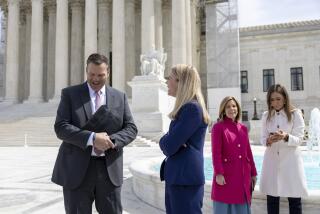COLUMN LEFT / LINDA R. HIRSHMAN : A Decision About More Than Abortion : The court has set a precedent of due process for citizens, without sexual distinction.
The Supreme Courtâs long-awaited deci sion on abortion restrictions deserved and got a lot of commentary. What was missed at first about the controversial outcome is that, in addition to reaffirming a core abortion right for women, the decision is a major change in the meaning and interpretation of the Bill of Rights. This change will have a profound positive impact in a world of other issues, ranging from gay rights to school funding.
In the Pennsylvania case, Planned Parenthood vs. Casey, the critical centrist justices--Sandra Day OâConnor, Anthony M. Kennedy and David H. Souter--said explicitly that there are things that the government cannot do to its citizens simply because they are citizens, even though the prohibitions are not explicitly set forth in the Bill of Rights. The court can call a halt to government when it excludes people from âthe social and economic life of the nation.â I call this new doctrine âcitizensâ due process.â
Feminists have been arguing for years--and the abortion cases made the issue unavoidable--that American citizens have rights beyond the specifics of the Constitution and that abortion rested not just on womenâs privacy but on a fair shot at American life. The three centrist justices, and even Justice Harry A. Blackmun, who wrote the majority opinion in Roe vs. Wade two decades ago as a privacy matter, have now acknowledged that claim. This is an important change in constitutional politics and law. Exchanging privacy for citizenship means that women are no longer asking to be left to do a shameful private act; they are asking for allowance to be a part of the American public. The pro-choice placards that, even today, tell the state to âGet your hands off my body,â should now read: âWomen are American citizens, too.â
Blackmun was right to remind us that he is 83; a lot depends on the politics of Supreme Court appointments in the next few years. But if the Senate Judiciary Committee does its job and future appointees must tell us how they stand on citizensâ due process, not only will abortion rights be largely preserved, but many other cutting-edge constitutional issues will be affected. The new test for constitutionality will be whether the governmentâs action impairs the ability âto participate equally in the economic and social life of the nation,â as the court wrote in Casey.
A few years ago, the Supreme Court ruled in another 5-4 decision that the Constitution doesnât protect gay men and women from state criminal sodomy laws. In that case, the state hadnât actually been throwing gay people in jail, so that issue is technically still open. Under the new citizensâ due process, gay adults could argue that, between consenting adults, a fulfilling personal sexuality is part of their right to a social life equal to that enjoyed by heterosexual citizens.
It is hard to imagine the court that decided the Pennsylvania case ruling that, without compelling other factors, gay citizens must choose between their sexuality and prison. The majority in Planned Parenthood vs. Casey also rejects the historical analysis that the majority used against the gay claim, which held that the Constitution didnât protect homosexual sex because it never had done so. In striking down the spousal notification requirement in the abortion law, the justices said quite clearly that they were doing so because the common-law doctrine that a married woman is a creature of her husband for legal purposes is a thing of the past.
Another example involves school funding. A decade ago, constitutional analysis went badly astray when the court ruled that the Constitution didnât stop the states from creating school districts of wildly unequal funding capacities. Many, but not all, states have disagreed, requiring various steps toward equal school funding under state constitutions. A concept of equal citizenship in the federal Constitution should forbid the states from engaging in grossly unequal school funding, a system that produces people uneducated to minimal political citizenship and often unable to participate in any economic life, because they canât hold any job at all.
As the justices said last Monday, protecting womenâs reproductive rights was the case of a generation, comparable in its impact on society to the decision to desegregate the schools. But even the abortion issue is not as important as the constitutional change it has produced.
More to Read
Get the L.A. Times Politics newsletter
Deeply reported insights into legislation, politics and policy from Sacramento, Washington and beyond. In your inbox three times per week.
You may occasionally receive promotional content from the Los Angeles Times.










